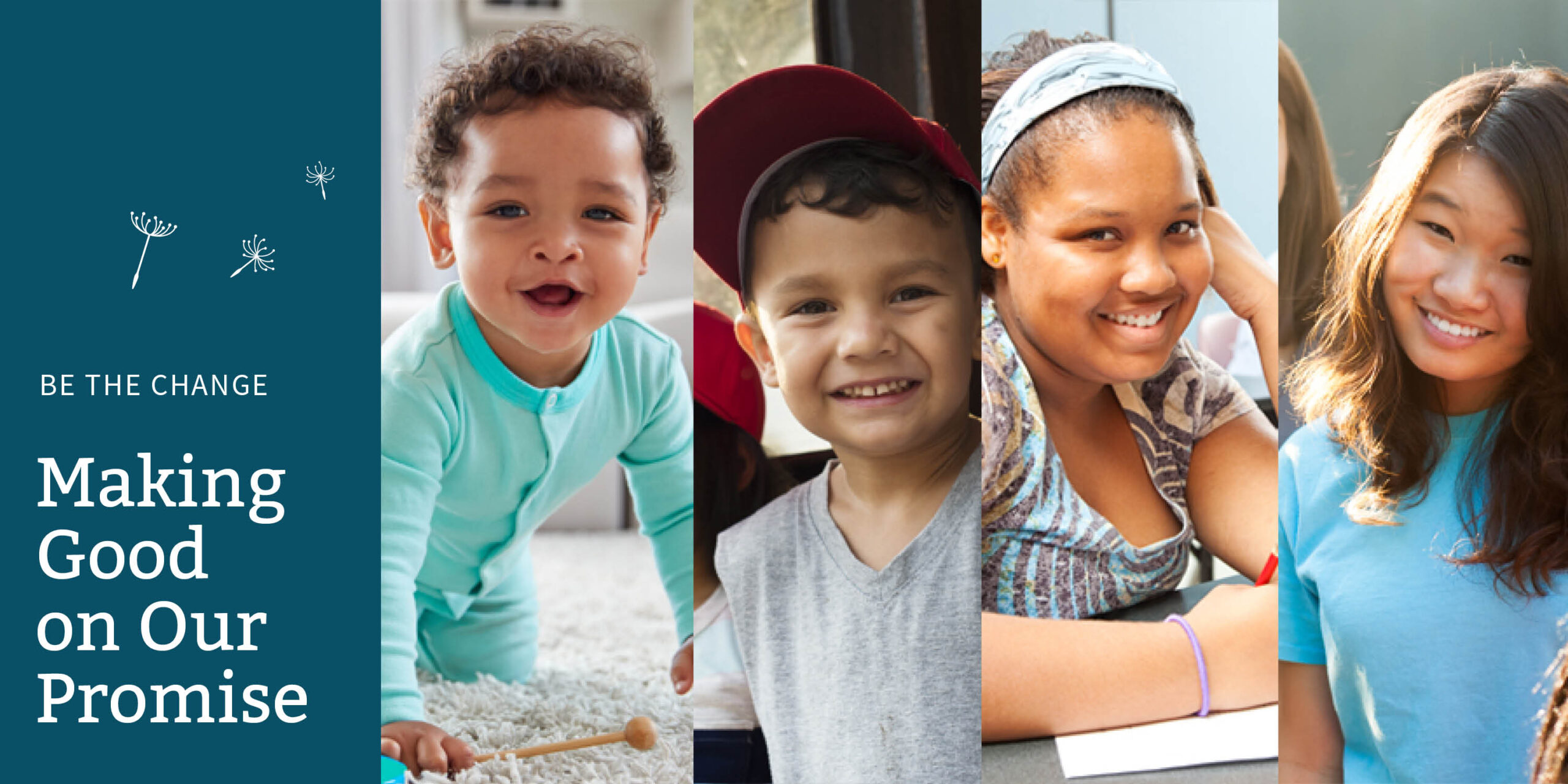Our purpose is to share community information in an accessible and engaging way so that everyone can better understand our local systems of education and be encouraged to get involved and take action.
Our Core Values: equity, engagement, and data-driven decision making.
Key Findings from the 2020 Report

Significant systemic factors are negatively impacting students in Forsyth County and negatively impacting our community's educational outcomes.
Many of these factors (such as family economic security, housing stability, mental health, and discrimination and bias) are “upstream” of our educational systems and affect students before they ever set foot in a classroom.

Many children in Forsyth County are not entering Kindergarten prepared to learn to read, and only about half of all third graders are proficient in reading.
Research shows that when a child falls behind on early reading proficiency, they are more likely to have poor educational and life outcomes.
Be The Change: Making Good on Our Promise
Register today for this important virtual kickoff event to catalyze collective community action for education!

Students of color have significantly worse educational outcomes than their White peers.
There are significant disparities across most of our educational outcomes by race/ethnicity.

There are many efforts underway in our community to address the biggest issues affecting our education systems.
It is critical for our community to better understand our educational systems, from cradle to career, and participate in efforts to increase equity and improve outcomes for all students.

“Students of color were less likely to be engaged in online instruction, potentially exacerbating existing disparities.”
African American and Hispanic/Latino students had consistently higher rates of non-engagement during the Fall of 2020.

People who are economically vulnerable have significantly worse educational outcomes than their economically secure peers.
There are significant disparities across most of our educational outcomes by socioeconomic status.

The COVID-19 pandemic has impacted and disrupted many aspects of education and learning in our community.
As we work to adapt our educational systems to a changing, increasingly digital reality, we continue to struggle with challenges around educational equity and access.

We need your help to improve the informational content of this report.
Our community’s educational systems are large and complex. This report strives to organize and communicate key information about these systems to equip community members to be better advocates; if you notice something that we missed or got wrong, please let us know.
The Forsyth Promise 2020 Education Report
The purpose of this report is share community information so that everyone can better understand our educational systems. This report is produced annually by The Forsyth Promise.
We Value Your Feedback
Please use this Google form to provide feedback.
Letter from Our Leadership
In 2020, the COVID-19 pandemic reshaped how our community learns and disrupted many aspects of our day-to-day lives. The closures of schools and child care facilities presented students with new challenges in learning and connecting and put working parents and caregivers in difficult or impossible positions. These and myriad other impacts on our community have tested our resolve, impacted our well being, and almost certainly changed our learning outcomes in ways we don’t yet understand.
Read the Full Letter
This is an annual report on the state of educational outcomes in Forsyth County, North Carolina for the year 2020. It’s purpose is to present high-quality, reliable information to inform a common, data-informed perspective amongst our community. This perspective is a critical tool that we can use together to engage in planning and decision-making and advocate for decisions that can improve outcomes. My hope is that every person who reads this report feels encouraged and prepared to get involved in our education system in some way.
Our community enters 2021 facing the dual crises of the COVID-19 pandemic and educational equity. The truth is that the pandemic only added stress to an educational system that was already grappling with major disparities in outcomes, specifically along racial/ethnic and socioeconomic lines.
2020 was a dynamic year in which racial bias, systemic discrimination, and aggression toward people of color was more visible and widely discussed than ever. I believe that, given the backdrop of these events, it is critical to continue to use our community’s data to clearly understand and communicate the facts around our racial/ethnic and other disparities. This year we are going one step further. We are not just reporting on outcomes but exploring the intersectional upstream factors that influence these outcomes. Many students in Forsyth County are experiencing major barriers to success in learning like family income insufficiency, housing cost burden and mobility, barriers to technical and educational resources, and physical and mental health, discrimination and implicit bias, just to name a few. The expert literature review contained in this report takes us a step closer to understanding the connection between broader systemic disparities and our educational outcomes.
2020 tested our resolve and it also reminded us to look out for one another and to work together to support each other through crisis. I hope that, in many ways, it reminded us of our common humanity and brought us closer together as a community. The Forsyth Promise worked more closely with Winston-Salem/Forsyth County Schools than ever, helping to align and coordinate the district’s pivot to Remote Learning Centers following the closure of schools.
In 2021, we want to put more intentional focus on children and their families. We want to tell a more complete story of the state of education in Forsyth County and to that end we will begin to showcase authentic lived experiences alongside data and context. I encourage you, whether you are a parent, student, educator, caregiver, healthcare provider, or an interested neighbor, to let us know if you have a lived experience you want to share with the community.
Every single person who calls our community home is an important stakeholder in our educational systems. Thank you for reading this report and I hope you feel inspired to connect with your neighbors and get involved. It is more important now than ever.
In service to children,
Charlette Lindell
Community Context Review
To understand our educational outcomes, we have to look beyond the classroom and see the whole child.
When a child is hungry, faces instability at home, or their family lacks the income to afford basic needs, they encounter barriers to success. To better understand our outcomes as a community, we must look beyond the classroom and recognize that, often, children are set up for success or failure before they ever step foot inside a classroom. The Community Context Review synthesizes local data and a scan of peer-reviewed literature to help inform a more complete perspective of these conditions and help make connections between these conditions and our educational outcomes.
Local Education Data
A better understanding of our educational systems empowers us to advocate for changes that can improve outcomes and equity.

Core Education Measures
Core education measures help us understand critical outcomes within our educational systems like third grade reading proficiency, ACT proficiency, and high school graduation. Core education measures span the cradle-to-career spectrum, from early childhood to higher education, and feature interactive data visualizations built from reliable, high-quality data analysis. Many measures are disaggregated by race/ethnicity and socio-economic status.
Equity Measures
While the disaggregated data provided through the core education measures helps us better understand disparities in outcomes, equity measures have been selected to help us understand critical aspects of educational equity in practice in our community, such as disproportionate discipline practices, segregation, access to resources, and diversity of educators and staff.

Stories of Lived Experience
“One’s mindset and desire to be successful can overcome one’s current economic status. If one is determined to be successful, (whatever success is for them) then they can be.”
TONYA L. WOODS, Parent of a 5th Grade WS/FCS Student | Go to the lived experience interviews

The COVID-19 Pandemic
Since 2020, the COVID-19 pandemic reshaped how our community learns, and disrupted many aspects of our day-to-day lives. It also illuminated existing inequalities that are now being exacerbated by a range of public health and economic impacts.
Our COVID-19 review examines how the pandemic is impacting student learning and wellbeing both locally and across the U.S.

Pathways to Action
We can work together to organize, advocate, and drive positive change.
When we work together, we have the power to change our systems for the better. We hope those who read this report feel encouraged and inspired to get involved. Local groups are working to support and improve our systems and there are many ways for anyone to get involved.

The Forsyth Promise is our community’s cradle-to-career education initiative.
Advocating for Equitable Educational Systems
Bringing People and Organizations Together
Helping to Improve Educational Outcomes at All Levels
We work across our local education systems to coordinate and align resources so that every child, regardless of race, ZIP code, or circumstance, can live up to their fullest potential in the classroom, in the community, and in life.
We invite you to learn more about how The Forsyth Promise is working to engage voices, change mindsets, and build community capacity to improve education locally.

